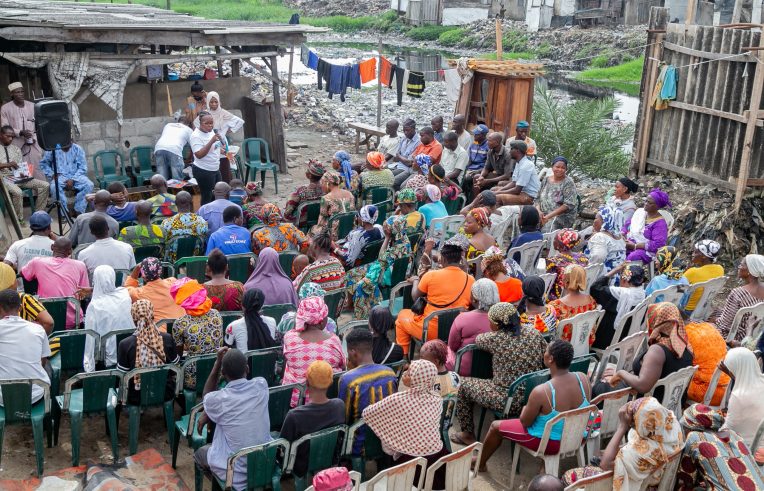“I have learned a lot about infectious diseases, for example, when we see anyone around us showing symptoms of an infectious disease like measles, we will advise them to go to the hospital or call the number of Disease Surveillance Notification Officers as seen on the pocket card.”
– Community Health Champion (Butcher)
Many people in Nigeria, especially 53% of the nation who live in urban slums, are vulnerable to infectious diseases, which can lead to economic losses and death. These preventable diseases require urgent actions that educate and empower people to take responsibility for their health. To fill this need, we designed a community health and hygiene project that provides social and behavior change interventions to these vulnerable groups in some select urban slums.
We launched the Strengthening Community Knowledge and Response on Infectious Disease Prevention (SCKaR-IDP) project, a community-based surveillance and behavior change project aimed at building capacities of key groups (market women, service workers, transport workers, artisans, and youth) on infectious disease prevention and detection in Somolu and Ajeromi-Ifelodun Local Government Areas (LGAs) of Lagos State. Targeted to reach 2,000 inhabitants of these communities, SCKaR-IDP aimed to educate community dwellers and turn them into Health Champions who are equipped with the knowledge and resources to identify and report visible signs and symptoms of infectious diseases, take appropriate actions to protect themselves, and prevent the spread of diseases in their communities.
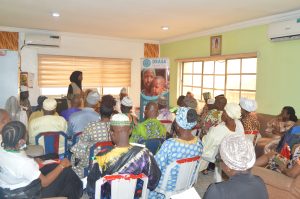
To ensure community buy-in and meet the needs of these community dwellers where they are, we visited and engaged both community leaders and their members to co-create a comprehensive response that would help combat infectious diseases. This involved advocacy visits, mapping exercises, gathering important information about these communities, and delivering sensitization campaigns specifically aligned with the needs of these key groups.
Building Relationships
In early February, we visited the Somolu and Ajeromi-Ifelodun LGAs to meet with key community influencers such as the Disease Surveillance and Notification Officers (DSNOs), Assistant Disease Notification and Surveillance Officers (ADSNOs), Health Educators, Environmental Health Officers, Community Health Extension Workers, Community Informants, Community Leaders, and project volunteers. The visits aimed to establish relations with these community stakeholders, create an understanding of our mission as an organization, and share information about the importance of the project and its relevance to their communities. As with other community health and hygiene projects, we also wanted to create room for co-participatory involvement in the project by not only describing the role they would play but also brainstorming the best tactics and approaches to ensure successful implementation in their communities.
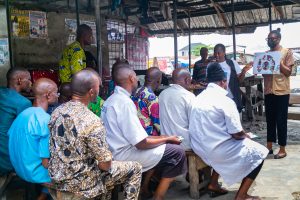
Mapping Communities
After receiving the approvals from the necessary community stakeholders to commence activities, we worked with the local health authorities in these communities–which included Environmental Health Officers (EHOs), Community Health Extension Workers (CHEWs), and Community Informants (CIs)–to map and identify key groups we wanted to reach in each of these communities. This mapping exercise, which covered all five wards in Somolu and 16 wards in Ajeromi-Ifelodun LGA, identified important groups and leaders in the communities as well as their roles, relationships, and influences in addressing potential infectious disease outbreaks. A total of 15 key groups were identified across both LGAs, including market associations, religious associations, youth associations, Traditional Birth Attendants, transport workers, and artisans. We also met with the leaders of these groups to decide on available days in their schedule to engage with the rest of their members.
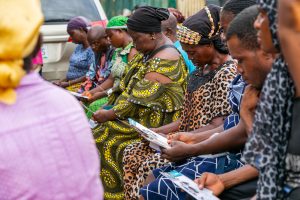
To establish our starting point before implementation began, we sought to understand the current situation, attitudes, and behaviors with a baseline assessment. This assessment allowed us to gain insight into the knowledge of community members, gather needed information, identify needs and gaps, and set realistic targets and benchmarks for future comparison which will enable us to evaluate progress and impact. A total of 780 key group members took part in this assessment.
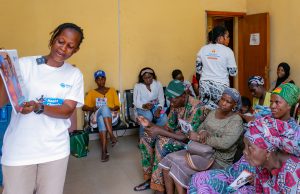
Armed with the insights gathered from our initial assessment, we commenced the training of these community members in 21 wards of these two LGAs in March. Our project team, along with the local health authorities, community health workers, and community informants, carried out an educational campaign aimed at raising awareness about infectious diseases among local communities. The participants were educated on the visual signs of prevalent infectious diseases, preventive measures that could be taken, and the necessary contact information to report suspected cases. They were also taught the types, causes, and modes of transmission of these diseases using a customized information manual. To ensure a lasting impact, each participant received a pocket card and an information card to take home containing needed details about infectious diseases and contact numbers of their DSNOs to report suspected cases.
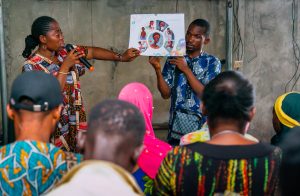
With 2,089 community members engaged in infectious diseases, SCKaR-IDP remains a success story. At the end of the project activities, more than 90% of community members knew how infectious diseases can be contracted, the common signs and symptoms of infectious diseases, as well as how to prevent them. Overall, we recorded a 43.2% increase in knowledge of infectious diseases by these community dwellers.
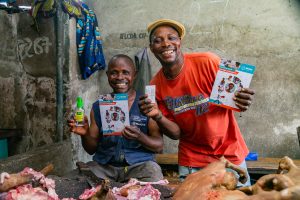
As the end of one stage marks the beginning of another, SCKaR-IDP is one of our Community Health and Hygiene projects which we are now working hard to scale and make self-sustaining in these and other similar communities.
We have learned firsthand the important role of community surveillance in national health security and we continue to work with our team of project staff, local health authorities, and the Health Champions we have equipped as these communities have since become hotspots for the ongoing cholera outbreak in Lagos State. So our Health Champions remain hard at work.
Check out the highlights from our SCKaR-IDP community health campaign here.




